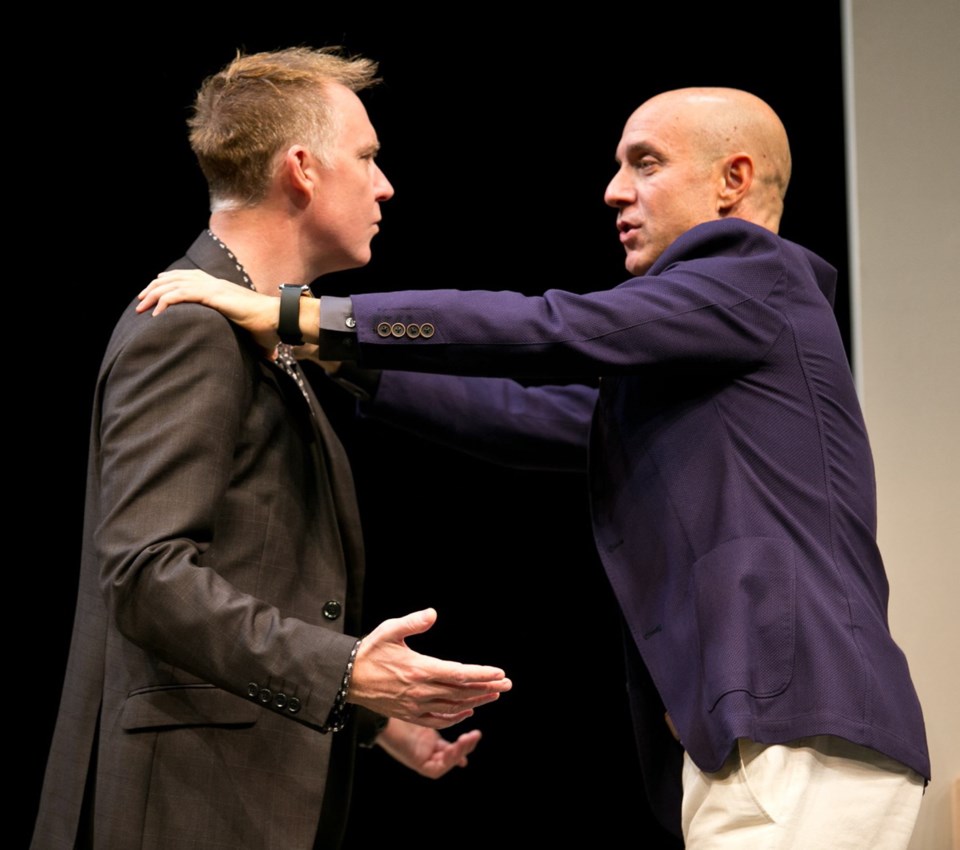What: Speed-the-Plow
Where: Belfry Theatre
When: To Oct. 11
Rating: Four stars out of five)
No playwrights expose the seamy side of the American dream with the gleeful brutality of David Mamet.
We see it in Glengarry Glen Ross, in which morally adrift salesmen lie, beg and cheat. In American Buffalo, a trio of low-lifers plots to steal a nickel. These are desperate Americans whose ideals are perverted by a world view incompatible with human decency.
Or so Mamet tells us.
The theme of the failed American dream is also explored in Speed-the-Plow, now being revived with energy and panache by the Belfry Theatre. The 1988 play, directed by Michael Shamata, is a satirical evisceration of the Hollywood film industry.
In vintage Mamet fashion, the audience is treated to the soul-crushing coarseness of a culture in which entertainment (the word “art” is scoffed at) is treated as a vulgarized commodity. We’re yanked head-first through the muck, but the playwright does it with such virtuosity, intensity and ribald delight, it’s a wallow worth taking.
Bobby (Brian Markinson) is a film executive so fresh to the job, a used paint can still sits in his newly renovated office. His old pal Charlie (Vincent Gale) bursts in with a once-in-a-lifetime proposal. An A-list star has agreed to star in a movie. If Bobby green-lights the project, it will make both of them rich.
The fly in the popcorn box arrives in the unexpected form of Karen (Celine Stubel), an attractive temp filling in for Bobby’s ailing secretary. Charlie makes Bobby a bet: If he can bed her, Bobby gets $1,000.
Yet Karen is more than just a pretty face. During the seduction scene, she makes a plea to Bobby: Would he consider producing an arty story about a dystopian world. It sounds like box-office poison, yet Karen’s siren-like call (and enticing good looks) are almost irresistible. It’s art versus commerce ... which one will triumph?
The play begins with Charlie’s pitch for his movie, which is another sex-and-violence cash grab. Realizing this is his sole chance at the big-time, Charlie’s practically bouncing off the walls — he says: “I’m jumpin’ like a leaf.”
Throughout this scene, Gale cuts like a razor-blade, making his character brittle and almost insanely hyperactive. It’s powerful in a way, but on Thursday night it seemed overdone, making Charlie seem like a playwright’s device rather than a real human being.
Yet this full-tilt approach worked well for the final scene between Charlie and Bobby, when the pair fight over which film (dystopian art or blood-and-guts adventure) will be made. Gale pleads for his project like a man fighting for his very life. He’s a cornered rat but, Mamet suggests, one can never underestimate the tenacity and intelligence of such a creature.
Amid the drama, there’s plenty of black humour. At one point Charlie, attacking the arty script, bellows: “I believe in the Yellow Pages, Bob, but I don’t want to film it!”
The role of Karen isn’t as juicy as the others. Although he tries, Mamet sometimes seems to have less empathy for female characters (as his play Oleanna attests). Karen is often merely reacting to the head-butting men. However, Stubel did shine in the middle act, in which her character attempts the seemingly impossible, that is, persuading Bobby to act on his higher instincts.
Stubel’s performance when Karen describes how her preferred script affected her was moving and convincing. And the way she made clear Karen was sexually available, with a fleeting word and look, was fine acting.
The lynchpin role in Speed-the-Plow is Bobby. Markinson, known for his work on television’s Mad Men, offered a terrific performance on opening night. His Bobby is frat-boy coarse when the occasion demands, yet Markinson also gave the character the oily avuncularity of a man relishing newly gleaned power.
In the final scene, Markinson’s cold gravitas in the face of Charlie’s desperate entreaties provided a wonderful contrast, imbuing the scene with tension and power. This is a very accomplished actor, able to convey as much with a look as a sentence.
The relationship between Bobby and Charlie is fascinating. They’re not so much friends as wary comrades connected by the filthy rope of commerce. At times, they seem almost to hate each other, yet there’s also a tortured loyalty that’s curiously admirable.
It’s a talky play — especially the first act, when Mamet’s love of cut-and-thrust banter threatens to submerge the action. Director Shamata has encouraged the actors to dig deep, to fully mine the immense themes (morality, fear of death) that the playwright ambitiously tackles.
It’s a strong, provocative production and a highly promising start to the Belfry Theatre’s 40th season.
